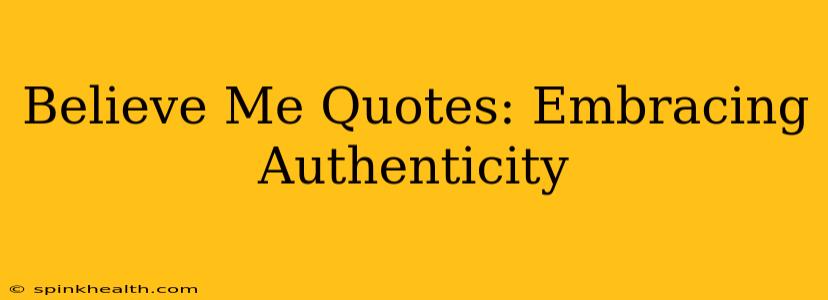In a world saturated with misinformation and carefully crafted personas, the simple phrase "believe me" can carry a heavy weight. It speaks to trust, vulnerability, and the inherent desire for authenticity. But what makes a "believe me" statement believable? And how can we navigate a world where such a statement can be both a powerful affirmation and a potential red flag? This exploration delves into the psychology of trust, the nuances of belief, and the importance of discerning authenticity in our daily interactions.
What Makes a "Believe Me" Statement Believable?
The power of "believe me" rests not on the words themselves, but on the context and the relationship between the speaker and the listener. Several factors contribute to the believability of such a statement:
-
Established Trust: A pre-existing relationship built on honesty and reliability significantly impacts the acceptance of a "believe me" statement. If someone has consistently proven their trustworthiness, their assertion is more likely to be believed.
-
Consistent Behavior: Actions speak louder than words. A person's behavior must align with their words. Inconsistencies erode trust, making future "believe me" statements suspect.
-
Nonverbal Cues: Body language plays a crucial role. Confident posture, genuine eye contact, and a calm demeanor can enhance the credibility of a "believe me" statement. Conversely, evasiveness or nervousness can raise doubts.
-
Contextual Evidence: Supporting evidence strengthens the claim. Providing details, examples, or references makes the statement more believable and less susceptible to skepticism.
-
Emotional Resonance: Authenticity often manifests in emotional honesty. A genuine emotional expression – whether joy, sadness, or anger – related to the statement can bolster its credibility.
How Can We Discern Authenticity?
Discerning authenticity requires careful observation and critical thinking. Here are some strategies to help:
-
Verify Information: Don't rely solely on a "believe me" statement. Seek corroborating evidence from multiple sources.
-
Assess the Source: Consider the speaker's track record, potential biases, and motivations.
-
Look for Inconsistencies: Pay attention to discrepancies between the speaker's words and actions, or inconsistencies in their narrative.
-
Trust Your Intuition: Your gut feeling can often be a valuable indicator of authenticity. If something feels off, investigate further.
-
Question Everything: A healthy dose of skepticism is essential in a world rife with misinformation. Don't be afraid to ask clarifying questions or seek alternative perspectives.
What are Some Examples of "Believe Me" Quotes That Resonate?
While the phrase itself might seem simplistic, many memorable quotes embody the spirit of trusting in oneself or another. These often appear in literature and film, encapsulating pivotal moments where faith and conviction are tested:
-
From literature: A character overcoming adversity might declare, "Believe me, I've seen the worst, and I'll get through this." This isn't merely a statement, but a testament to resilience.
-
In personal testimonials: A survivor sharing their story might say, "Believe me, it's changed my life." The weight of their experience lends credibility to their words.
Why is Trust Important in Relationships?
Trust is the bedrock of any meaningful relationship, whether personal or professional. Without trust, communication breaks down, suspicion flourishes, and cooperation becomes impossible. A "believe me" statement, within a trusted relationship, becomes a shorthand for shared understanding and mutual respect. When trust is broken, rebuilding it requires significant effort, patience, and consistent demonstration of trustworthiness.
How Can I Build Trust with Others?
Building trust is a process that requires consistent effort and genuine commitment. Here are some key strategies:
-
Be Honest and Transparent: Open communication is crucial for building trust. Be truthful in your words and actions, even when it's difficult.
-
Keep Your Promises: Follow through on your commitments. Consistent reliability builds confidence and strengthens trust.
-
Be Empathetic and Understanding: Show genuine care and concern for others. Listen actively and try to understand their perspectives.
-
Be Accountable for Your Actions: Take responsibility for your mistakes and learn from them. This demonstrates maturity and integrity.
-
Be Vulnerable: Sharing your true self, imperfections and all, fosters deeper connections and strengthens trust.
In conclusion, the phrase "believe me" carries significant weight. While its effectiveness hinges on the context and the relationship between the speaker and listener, fostering trust and practicing critical thinking are essential for navigating the complexities of human interaction. Authenticity, in all its nuanced expressions, remains a powerful force that can bridge divides and build enduring relationships.

